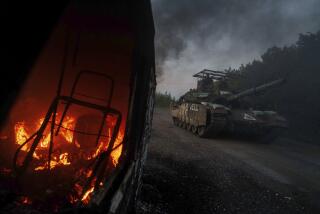Chechen Exodus Resumes as Exit Points Reopen
- Share via
SLEPTSOVSKAYA, Russia — Russia allowed thousands of frightened and angry civilians to flee war-battered Chechnya on Thursday after blocking them at the border for more than a week.
Russian ground forces, meanwhile, continued heavy artillery and rocket assaults in Moscow’s campaign to wipe out Muslim militants in the separatist republic.
More than 200,000 people have fled Chechnya since Russia’s offensive began in September. Most have gone to the neighboring republic of Ingushetia.
Russia closed all crossings out of Chechnya last week. On Monday, it allowed only a few people to cross into Ingushetia, sparking sharp criticism at home and abroad.
Officials relaxed controls Wednesday at the Sleptsovskaya crossing, where thousands of refugees had massed, and allowed many more people to cross Thursday. Refugees were also allowed to enter Ingushetia at a crossing farther north, at Malgabek.
There were no immediate figures on those who crossed Thursday. But the Sleptsovskaya crossings appeared to number as many as 500 people an hour, and a Russian soldier at Malgabek said hundreds more crossed there.
For those who got out, relief was mixed with fury at having to flee the Russian military assault.
“It’s impossible to stay in the village; you can’t let your cow out,” said Tatyana Durchiyeva, who fled the village of Arshty. “The soldiers steal everything. . . . They drink vodka and trample our vegetable plots with their tanks.”
For the first time, officials were allowing combat-age Chechen men to enter Ingushetia. Previously, they had allowed only women, children and the elderly to leave Chechnya.
The openings came amid increasing international pressure. President Clinton expressed concern to Russian Prime Minister Vladimir V. Putin at the Mideast peace summit in Oslo this week.
In Washington, Stephen Sestanovich, a senior State Department official, told Congress that other countries need to do more to condemn Russia’s tactics, adding: “The use of indiscriminate force against innocent civilians is indefensible.”
The United Nations sent a mission to the Ingush side of the border, prompting more attention to the refugees’ plight. The head of the mission, Nicholas Kassidis, said Thursday that the world body was preparing to send food, medicine and clothes.
More to Read
Sign up for Essential California
The most important California stories and recommendations in your inbox every morning.
You may occasionally receive promotional content from the Los Angeles Times.










